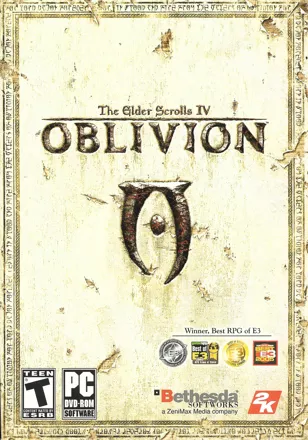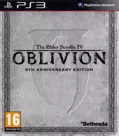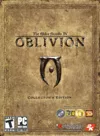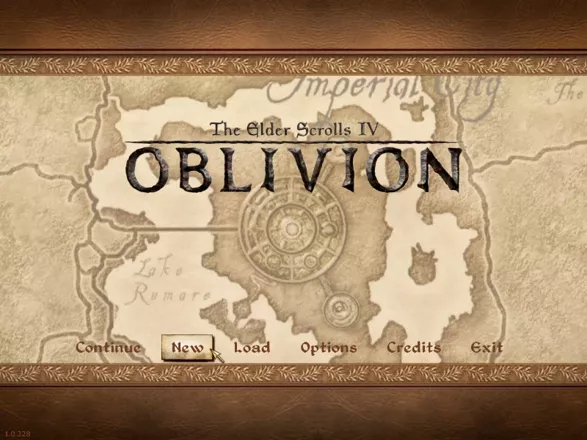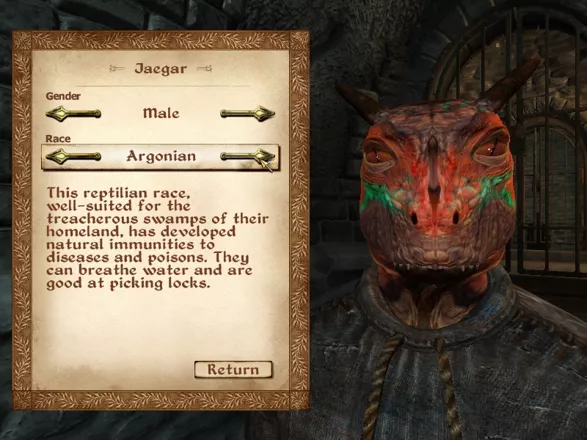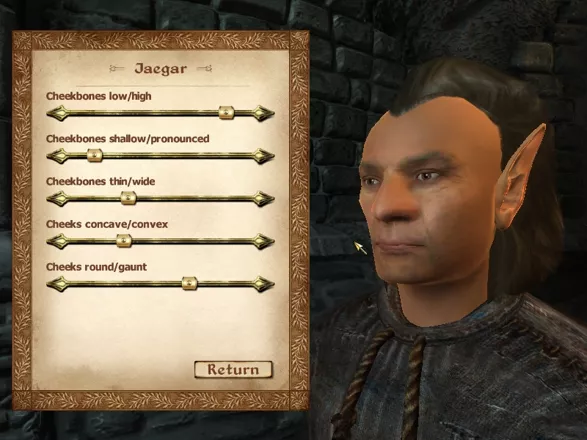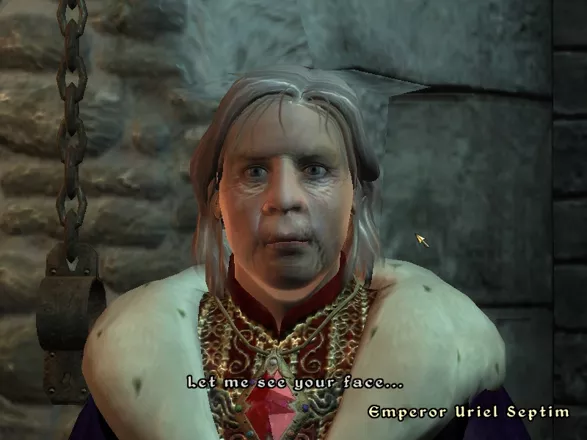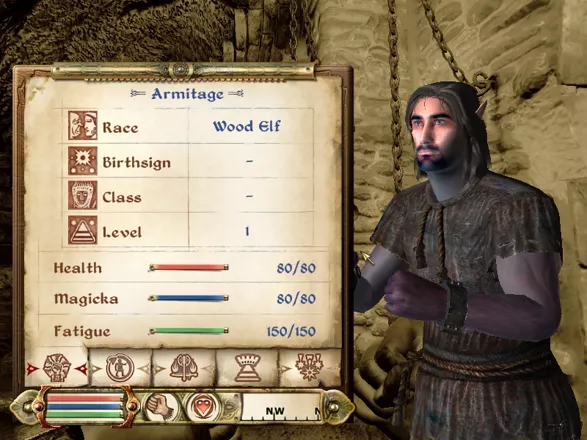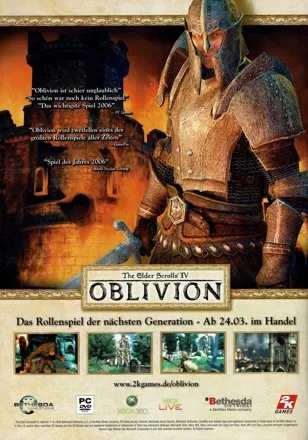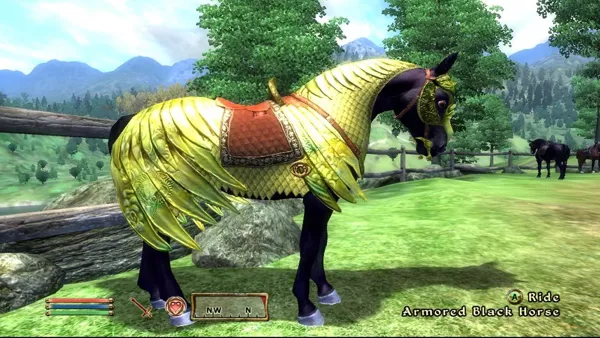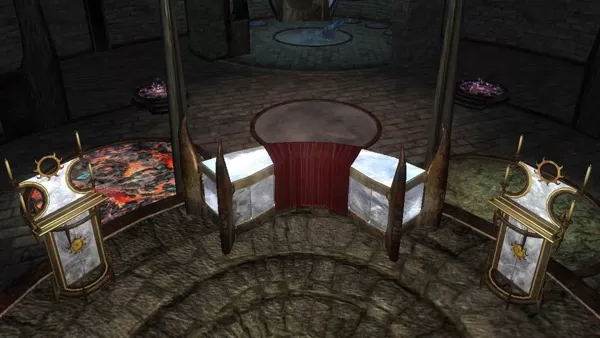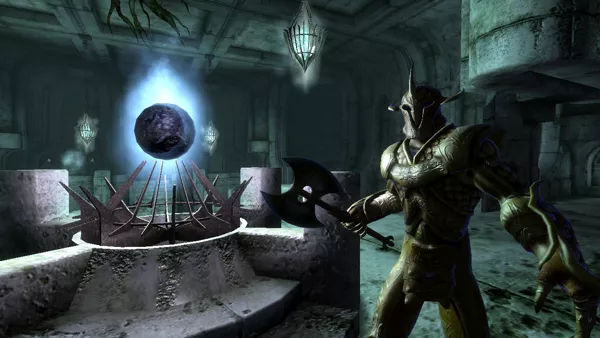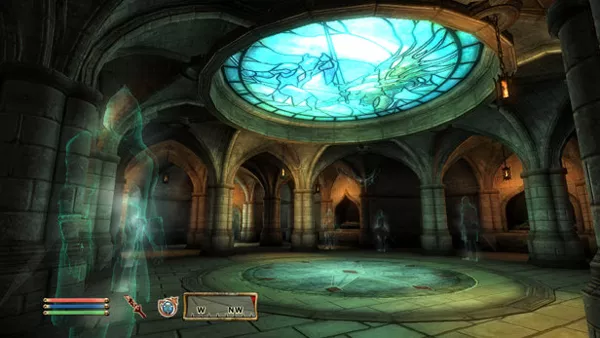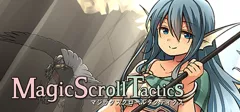The Elder Scrolls IV: Oblivion
-
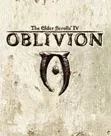 The Elder Scrolls IV: Oblivion
(2006 on
J2ME)
The Elder Scrolls IV: Oblivion
(2006 on
J2ME)
Description official descriptions
A lowly prisoner has been cast into the depths of the dungeon in the Imperial capital of the province Cyrodiil. The fate of this prisoner suddenly changed when Emperor Uriel Septim descended into the prison with his guards, fleeing from unknown assassins who have already slaughtered his children. But even an emperor cannot escape his destiny. Before the last assassin delivered the lethal strike, the old emperor entrusted the prisoner with the Amulet of Kings and asked him to find his illegitimate son, the last of the Septim bloodline. The Septims and the Amulet are the last barrier between the continent Tamriel and the dark dimension of Oblivion, and the delicate balance is threatened by the Daedra Prince of Destruction, Mehrunes Dagon, the prisoner being Tamriel's only hope.
Oblivion is the fourth title in Bethesda's Elder Scrolls series. The game sticks to the style of its predecessors featuring action-based combat, first-person and third-person views, and vast free-roaming environments. The player's chosen race and class determine the abilities the protagonist has in the beginning. The game allows the player to develop multiple types of characters without being limited to a specific role.
The advancement system, as was the case in previous games, is based on skill usage. When the player repeatedly uses one of the skills, it improves. NPCs offer training (for a price) to help in advancing to the next stage. In time the protagonist can become an Apprentice, Journeyman, Expert, and Master and gain certain bonuses for the skill. The skills of the foes are "leveled" to be approximately equal to or slightly above those of the main character.
There are numerous side quests that help the hero advance his or her abilities as well as gain fame. The player is free to roam the world without a particular goal, exploring towns, forts, caves, mines, and old temple ruins. Visiting shrines scattered around Tamriel grants the protagonist specialized skills, some permanent and some temporary.
Weapons and armor wear out with use and need to be repaired either with the help of special non-playable characters or by using an appropriately trained Armorer skill. Enhanced items (weapons, armor, clothing, rings, amulets) abound in the game for protection, resistance, reflection, and special activities like walking on water, exploring underwater, becoming invisible, or lightening the load. It is possible to open the gates to the Oblivion realm to grab their sigil stones, which can be used to make enhanced items. Higher-level mages can create their own spells and enchant weapons, armor, and clothing using filled soul gems in addition to sigil stones.
As opposed to Morrowind, mana points gradually regenerate over time, without the need to rest to replenish them. Active blocking has been added to melee combat. The game features full voice acting for all the NPCs. Dialogues typically contain fewer topics than in Morrowind, but more responses unique to different characters. In addition, the so-called "radiant AI" system makes characters follow their own schedules, engage in various activities, or talk to each other regardless of the player's input. The game features fast traveling, allowing the player to instantly visit Cyrodiil's major cities or previously explored areas.
Spellings
- 上古卷轴IV:忘却之地 - Simplified Chinese spelling
- 上古捲軸4:遺忘之都 - Traditional Chinese spelling
Groups +
- Animals: Cats
- Elder Scrolls series
- Fantasy creatures: Elves
- Fantasy creatures: Goblins
- Fantasy creatures: Minotaurs
- Fantasy creatures: Orcs
- Fantasy creatures: Trolls
- Fantasy creatures: Unicorns
- Gameplay feature: Alchemy
- Gameplay feature: Arena fighting
- Gameplay feature: Armor / weapon deterioration
- Gameplay feature: Auto-mapping
- Gameplay feature: Character development - Repetition
- Gameplay feature: Drowning
- Gameplay feature: Equipment quick slots
- Gameplay feature: Fishing
- Gameplay feature: Horse riding
- Gameplay feature: House ownership
- Gameplay feature: Interior decorating
- Gameplay feature: Journal
- Gameplay feature: Lock picking
- Gameplay feature: Paper doll inventory
- Gameplay feature: Pickpocketing
- Games made into books
- Green Pepper releases
- Middleware: Bink Video
- Middleware: FaceFX
- Middleware: Gamebryo / Lightspeed / NetImmerse
- Middleware: SpeedTree
- Physical Bonus Content: World Map
- Physics Engine: Havok
- PlayStation 3 Greatest Hits releases
- Protagonist: Female (option)
- Protagonist: Visually customizable character
- Software Pyramide releases
- Technology: amBX
- Technology: FaceGen
- Xbox 360 Classics releases
Screenshots
Promos
Videos
Add Trailer or Gameplay Video +1 point
See any errors or missing info for this game?
You can submit a correction, contribute trivia, add to a game group, add a related site or alternate title.
Credits (Windows version)
285 People (239 developers, 46 thanks) · View all
| Executive Producer | |
| Senior Producer | |
| Lead Programmers | |
| Lead Artist | |
| Lead Character Artist | |
| Lead Dungeon Artist | |
| Lead Designer | |
| Quality Assurance Lead | |
| Producers | |
| Programming | |
| Additional Programming | |
| [ full credits ] | |
Reviews
Critics
Average score: 93% (based on 174 ratings)
Players
Average score: 3.8 out of 5 (based on 285 ratings with 13 reviews)
The Good
I see a pattern in the elder scrolls series, while I know some people will disagree, I felt the series got its start on the wrong foot. I just didn't care for Arena, the first game in the series even if the ambition of the project got some respect from me. Then Daggerfall came, and provided one of the most epic RPG experiences of all time, garnering my game of the year and quite possibly my favourite CRPG next to Fallout. While there were a couple good spinoffs, such as Battlespire and Redguard, it would be a long 6 years before we were given a true sequel. While I know some people feel different, Morrowind was a disappointment. To me, it lacked what made Daggerfall epic and I just couldn't get into the game. Yet when I started noticing the pattern of "Bad, Good, Bad, Good" I knew that the next entry had to be great.
I was right. When Oblivion came, I was treated to another incredible Elder Scrolls game. While it may not have been as awesome as Daggerfall, and it was definitely smaller than Morrowind and Daggerfall, but it was still an ambitious, beautiful, and incredible game. The first thing one notices when entering Oblivion are the graphics. The game came out 4 years ago and it still looks wonderful. The world in Oblivion is a paradise, and there are various locations that look and feel different. Many towns and places to explore. Exploring an Elder Scrolls game is always a treat, and Oblivion provides plenty of surprises for explorers.
The music is beautiful too, wonderfully composed and always fitting the mood and tone. The sound effects are decent, and it is nice to have full voice acting this time around, which means that if someone is giving a long, 3 minute speech it no longer requires you to read a novella to know what they are saying. There are some problems with the voices though, which I will list below.
The gameplay is definitely Elder Scrolls, you play from a first person perspective and you get various weapons of your choice and you can cast spells, pick various races, traits, and skills. The role playing system has been improved in some areas as well, such as the fact that you now learn skills not by picking them, but by doing them - much like in real life. Walking the wilderness, hiking, jumping will increase your agility and speed, simply swinging a hammer in battle, hit or miss, will slowly build your knowledge of blunt weapons. It is an intuitive and unique way to learn skills and helps the immersion.
The game is very easy to pick up and play, even those who shy away from RPGs or have no prior knowledge of the series can pop Oblivion in and get straight into the action and have fun. While there are some negative side effects of this, which I will list below, it means that Oblivion has something for everyone even casual gamers.
Freedom is another large aspect, your character can be a peace loving alchemist that makes and sells unique potions, or he/she can be a dark mage that has a nasty habit of melting your face if you stare at him wrong, and so many other possibilities. Most quests have choices to make and they can be done in your own time or style. As large as the game world is, the amount of quests is even bigger. There are enough quests that it could take a player a year just to see half of them, and as always, new quests and objects are found through the reward of exploration. You can join guilds, too. My favourite was the mysterious dark brotherhood, who make you an assassin. There is a quest for the Dark Brotherhood where you must kill a bunch of guests in a house as they search for a fake treasure, and you must mingle and slowly pick them off, you don't get your bonus unless you kill them silently and unseen, which raises panic in the group. Its like being the killer in your very own murder mystery, and its a helluva lot of fun. The Dark Brotherhood also gets rep because they can make you a vampire, and vampires rock.
The titular world of Oblivion is also a very memorable part of the game, coming across as a marriage between Hell and Mordor. Lots of freakish demons, mazes, and strange things await you in Oblivion, and each time you enter a gate its sure to give you a spooky feeling and a fight for your life.
The Bad
Although the game can immerse you at times, there are many bugs and problems that can sometimes break immersion. Animations are poor, characters literally freezing to talk and stiffly staring at you. Its somewhat creepy. Speechcraft is also a lame element, as it always has been, and makes little sense and simply isn't fun, on the contrary its a nuisance but the game forces you to use it a lot if you wish to get your desired result.
The voice acting is also often poor, while there are moments that the voice acting is decent, you will run into tons of people who have no interest in what is going on and just speak their lines in a dull manner, and you will also run into tons of people who all sound the same.
Scaled leveling doesn't work here, although it worked in Fallout 3 due to the small monster roster as well as other elements, in Oblivion scaled leveling is an annoying feature, and it'll take you ages before the action truly heats up and the best of the monsters appear. Leveling up is also somewhat confusing in Oblivion, you have no idea how much experience you have and you will level up at random, long intervals and sometimes you won't even know it, its also annoying that when you level up, you cannot tweak your skills until you go to sleep.
The graphics, while great, can get repetitive. The land isn't nearly as varied as previous Elder Scrolls games, maybe excluding Arena, and as lush and pretty as the greenery is you will want to see more and very few areas truly deviate from that look and many places you stumble upon, excluding ruins/caves/etc. that are run by humans have little to differentiate from other such places and feel incomplete.
The Bottom Line
Overall, Oblivion is yet another vast, gorgeous and ambitious game from Bethesda. Its easy to pick up and play even for those who don't like RPGs or don't play them that often, such as myself, and it improves on Morrowind in gameplay and has a buttload of content which will last you a long time, giving you tons of bang for your buck. Its not as good as Daggerfall, but it is easily the second best game in the series.
Windows · by Kaddy B. (777) · 2009
The Good
Oblivion is, for most purposes, a typical Elder Scrolls game: it puts you into a gigantic world which you can freely explore and undertake any quest you are interested in. One of the problems of its predecessor were boring, repetitive side quests that took the joy out of experimentation. Fortunately, Oblivion pays more attention to this; in fact, some of its side quests are more interesting than the "save the world" main mission. Working for the Thieves Guild or the assassins, you will discover some tasks that require you to make choices and generally involve a bit of variation on the usual "go to place X, kill person Y and bring me item Z" formula.
Like other Elder Scrolls games, Oblivion is set in large world with plenty of background. Dialogues contain tons of information about the world. One thing I loved in it was the abundance of books. I always like it when developers dedicate their time and skills to something that could have been simply left out. For example, I read with a great pleasure a story about a thief who had to sleep with the ugly wife of the person he was robbing in order to escape. It was just a book I found in one of the many stores. It has absolutely no significance to the story. But it was so well-written, with wonderful style and humor, that it left me wonder why the writers couldn't do the same for the conversations between the game's characters.
"Size doesn't matter", some people say. Well, it's still nice that Oblivion doesn't confine itself to narrow passages some other modern RPGs tend to do. You are free to explore this world in any way you like. Emerging from the first, tutorial dungeon into the open wilderness is an amazing sensation. Fortunately, not every location is marked on your ubiquitous map, so there is still some stuff to discover by yourself, without jumping from dot to dot.
The "radiant AI" was a welcome change from the signposts that were the NPCs of Morrowind. You can see characters talk to each other and perform some routines - less convincingly so than in Ultima VII, but impressive nevertheless. It was fun to take a stroll through the quiet alley surrounding the Mages Guild in the Imperial City and contemplate a Khajiit sitting on the bench and reading a book.
Oblivion has great graphics, and they are more than just eye-candy. The world is detailed, there are many objects everywhere, each room is stuffed will all kinds of things, not just important items like potions or alike, but candles, apples, quills, plates, mugs - regular household items. And you can interact with all that physically. There is a "grab" action in Oblivion that allows you to drag things in any direction, much like in Ultima IX, but with a more realistic physics system. It feels great to push tables and see how things fall off it. I know this is just fooling around, but that's one of the things I like doing most in games.
You can also jump, climb, sneak, swim, and generally do whatever you like in the world of Oblivion. The meticulous customization is always a joy. Alone the character creation is almost like a mini-game of its own. You don't just pick a character out of the several available pre-made ones, but create his face and body. You can even adjust things like nose shape and the color of eyebrows - with a little patience, you can make the hero of Oblivion look like yourself.
There are plenty of spells, and you can also make some of your own. You can play as a thief - there is a physical stealth element in the game. I liked the fact that you develop your skills simply by using them repeatedly (like in Quest for Glory games). This is a simple idea that makes the gameplay addictive, and in many cases very rewarding, because you feel you really did something, not just fought many monsters and miraculously became stronger overnight.
I found the music wonderful. I don't think there is a need to introduce Jeremy Soule to anyone who pays attention to music in video games. Much like the graphics, the music here is a very sensual experience. Sure, you could call it "generic fantasy orchestral track", and that is indeed the genre it belongs to, but it's the choice of melody, the harmonies, the detailed orchestration that make the difference. And there is full voice acting in the game, which is always a plus in my book.
Oh, and you should definitely get the expansion, Shivering Isles. It gives the game a much-needed "edge" both in visual presentation and quest content.
The Bad
Compared to the intriguing, fascinating world of Morrowind the setting of Oblivion is a disappointment. It is just your archetypal European-style medieval fantasy environment with somewhat repetitive scenery and locations. It's still beautiful, but it doesn't quite capture the magic of the previous game. The recycled textures in the dungeons also do little to preserve the ominous atmosphere that envelops you when you venture into one of those places for the first time.
Like other Elder Scrolls games, Oblivion pays little attention to narrative and writing. The main story is very short, very simple, and quite uninteresting. The only more or less exciting part, the search for the missing Emperor's son, was over way too early. Very soon you learn everything about your antagonists, and from that point on it becomes the usual hunt for items required to defeat the bad guys. I also think that the "save the world" urgency didn't sit well with the laid-back pace of an Elder Scrolls game, and was less exciting than the gradually unveiling mystery of Morrowind.
Why is there fast-traveling to cities you have never visited before? Who on Earth came up with this idea? I remember how interesting and rewarding it was to look around everywhere in Morrowind, which forced you to explore physically because there was no other way to discover locations. What's the point of exploring if there is always an easier and quicker way?
Despite the well-written books (which were actually ported from Daggerfall, if I'm not mistaken) and the overall clear improvement over Morrowind, the writing in the conversations is still painfully impersonal. The dialogue is there just because you'll need to receive quests and obtain information. The NPCs have no personalities, and there is no single living soul in this whole world you can become attached to. Remember your friends in Gothic games? Well, here, technically, you also have friends; but they are, with very few exceptions, distant and forgettable.
The levels-scaling system almost ruined the game for me. Basically, the stronger you become, the stronger are the enemies around you. I always loved this feeling in RPGs when you grow strong and then go to some place with enemies who seemed so tough before and just whack them in two hits (Gothic games were great at that). Well, you can't do that in Oblivion. You can get to level 99 and then go to some place where you saw level 1 bandits, and you'll see the've become level 99 as well, and on top of that magically procured very strong and rare enchanted armor. So if you don't specialize in combat, those level 99 bandits will actually kick your level 99's ass faster than they did when you both were humble level 1. So much for character growth.
The items you can find in dungeons are randomized and also scaled to your level. So you can forget about being a low-level guy who ventures into a dangerous dungeon and gets that super-strong sword before vicious creatures can tear you to pieces (and again, Gothic conveyed that feeling superbly). If you are low level, your reward will be low level as well. If you are high level, you'll already have found better stuff due to the fact of you being at high level. It's a bit like communism, actually. Sounds logical in theory, but makes life very boring.
The Bottom Line
Oblivion is a hard game to review. It improves upon Morrowind in several ways, but also retains many of its shortcomings and adds some new ones. Its dubious design choices are irritating, and you can't help thinking what it would have been if it had more charisma. And yet, despite all its flaws, Oblivion is still as fun and as addictive as only an Elder Scrolls game can be. Yes, it is a generic fantasy world, but one you can lose yourself in for hours without noticing how the time passes. It will probably not convert a new player to the series' fandom, but will certainly satisfy those who enjoy full-scale freedom and sensual immersion in a virtual world.
Windows · by Unicorn Lynx (181780) · 2018
a small step forward, a large step backward
The Good
The graphics engine is finally good. It actually runs faster than Morrowind while managing to cram in tons more detail and kilometers of viewing distance.
The landscape looks much more realistic than in Morrowind.
Radiant AI is an improvement from NPCs just standing there.
The Bad
My biggest complaint is that the enemies scale with you. This means that at the beginning you'll be fighting bandits with leather armor and weapons and then towards the end you'll fight bandits with glass armor and weapons and higher levels. And it's not just that there's a higher probability of meeting tougher bandits. At each level there's only one set of bandits that you'll meet. You'll never meet bandits with cool equipment at lower levels. And this goes for all enemies. This makes leveling kind of pointless since any enemy you meet will be adjusted to your level. But that's actually a bit broken. See, if you invest in combat skills it'll be easy, but if you invest in magery, or heck, the more social skills, it'll be really hard and even impossible. This is a really dumb and game-breaking feature, and I don't understand what they were thinking at all. There are mods out there that address this but none fix it completely.
Equipment scales as well... that's right, the artifact's power depends on which level you are when you find it.
The graphics engine is good, but the graphics themselves are kind of boring. The Imperial City is truly something to behold, but only when viewed from afar. Inside the city everything looks bland, thick, cartoony, unreal. It just feels... wrong. Morrowind had beautiful, varied architecture, from the familiar Imperial to the breathtaking Telvanni organic strongholds. In Oblivion it's all Imperial. The greatest variety is stone vs. wood buildings. Humans look absolutely awful. Not awful as in low-poly. Rather, they look like they all have Down's syndrome. Seriously.
The physics engine doesn't add anything to the game at all. I don't see why they included it.
The interface is terrible. Big ugly fonts, lots of ugly icons, and worst of all, an omnipresent GPS that shows nearby points of interest and with an arrow to your next objective. You can mod the GPS out, but it's pointless since none of the quest-givers tell you where to go, as they just assume you'll follow the friendly arrow.
Mana now regenerates on the fly, not just when sleeping. This makes mages much less tactical and spells into just another sort of mundane weapon. The levitation spell is gone.
There are only two types of dungeons: Goblin caves and ghost caves. And they all look exactly the same.
Whereas Morrowind felt more like a coherent world where things happen if you are there or not (even though they didn't really), Oblivion felt like I was playing an arcade game, where every single object and feature was there for some carefully thought-out (but sometimes badly implemented) gameplay element.
There's tons more to say of course, but I'll stop here.
The Bottom Line
A dumbed-down cartoony Morrowind. It's not outright bad. Certainly it's better than some of the more recent RPGs, but it could have been so much more.
Windows · by dorian grey (243) · 2007
Discussion
| Subject | By | Date |
|---|---|---|
| Incorrect group “Gameplay feature: Fishing”? | cawa | Aug 2, 2023 |
| Odd inclusion in game groups. | Indra was here (20756) | Sep 8, 2009 |
| The Real Barenziah | Unicorn Lynx (181780) | Oct 8, 2008 |
| Glowing faces? | Daniel Saner (3503) | Dec 28, 2007 |
| Perspective | DreinIX (10446) | Dec 26, 2007 |
Trivia
1001 Video Games
The Elder Scrolls IV: Oblivion appears in the book 1001 Video Games You Must Play Before You Die by General Editor Tony Mott.
Cancelled PSP version
A PSP version was in development and planned for release in the Spring of 2007, but it was eventually cancelled with no official word.
Development
The game has been in development since mid 2002. The long period of development was necessary due to the implementation of a new Radiant AI system and the graphics. A player may encounter while travelling the world of Tamriel: 35.544 shrubs and bushes, 67.730 plants and mushrooms, 94.013 trees and fallen logs, 395,696 rocks and about 1500 NPCs.
DLC
As a part of Xbox Live's Deal of The Week, Bethesda Softworks released all Oblivion downloadable content for half the price in April 2009. For Horse Armor however, the price was doubled, proving that Bethesda didn't take the criticism against their first DLC pricing too seriously.
ESRB
On 05/03/2006, the ESRB re-rated this game from T (Teen) to M (Mature) and added a "Nudity" attribute because of a secret topless skin that is present on the game media and because there is allegedly more blood and gore in the actual game than shown in the video footage that was originally presented to the ESRB for rating.
This is the second Take-Two game that has undergone an ESRB re-rating, the first one being the notorious Grand Theft Auto: San Andreas.
German version
One book found in the property of a killed necromancer, called "Wälzer des Unlebens" in the German version, contains just bloody drawings of symbols. In the German version, they were replaced a sentence describing the symbols.
References
The 'Shadow over Hackdirt' quest makes several references to one of the most famous novel by HP Lovecraft: The Shadow over Innsmouth. There are references to the 'Deep Ones', the Brethren, a whole town of suspicious people, caverns underneath the earth and so on.
References to the game
The Elder Scrolls IV: Oblivion was parodied in an episode of "Die Redaktion" (The Editorial Team), a monthly comedy video produced by the German gaming magazine GameStar. It was published on the DVD of issue 08/2006.
Title
By highlighting certain letters, it is made clear in the menu menu that it is no coincidence Bethesda chose the title "OblIVion" for the fourth main game in the Elder Scrolls series.
Awards
- Computer Games Magazine
- March 2007 - #2 Game of the Year 2006
- GamePro (Germany)
- February 01, 2007 - Best Console RPG in 2006 (Readers' Vote)
- Games for Windows Magazine
- March 2007 - Game of the Year 2006
- GameSpy
- 2006 – #8 Game of the Year
- 2006 – PC Game of the Year (Gamers' Vote)
- 2006 – #2 PC Game of the Year
- 2006 – #10 Xbox 360 Game of the Year
- 2006 – PC RPG of the Year
- 2006 – PC RPG of the Year (Gamers' Vote)
- 2006 – Xbox 360 RPG of the Year
- 2006 – PC Mod of the Year (for Oscuro's Oblivion Overhaul)
- GameStar (Germany)
- Issue 12/2008 - One of the "10 Coolest Levels" (for "A Brush with Death" because it connects simple technical variations with a big passion for stories. )
- Golden Joystick Awards
- 2006 - Ultimate Game of the Year
- 2006 - PC Game of the Year
- 2006 - Console Game of the Year
- PC Powerplay (Germany)
- Issue 02/2007 – Best RPG/Adventure in 2006
- Issue 03/2007 – Best RPG/Adventure in 2006 (Readers' Vote)
Information also contributed by EboMike, karttu, Mad Griffith, MDMaster, PCGamer77, piltdown_man and tata_lu_stefan_cel_mare
Analytics
Upgrade to MobyPro to view research rankings!
Related Sites +
-
Adamantytowa Wieża
Polish site devoted to the Elder Scrolls series. -
Alex's Oblivion Guide
Solutions and strategies on HonestGamers.com -
GameFAQs Files
Collection of guides and FAQs contributed by GameFaqs users -
GamePressure Guide
Another strategy guide for Oblivion -
OXM UK's oblivion forum
The UK Official Xbox Magazine Oblivion forum. -
Oblivion Hint File
Solution to Oblivion in question and answer format. -
Oblivion Official Site
at Elderscrolls.com -
Planet Elder Scrolls
The biggest collection of Mods, articles, screenshots and discussions related to the Elder Scrolls Series -
TES4: Oblivion - Portal
Community, forums and news on this Fan site. -
The Elder Scrolls
Official website for The Elder Scrolls series -
The Elder Scrolls IV: Oblivion Source
The resource for all things for Oblivion. Here you can find the TES4 Construction Set. -
Universal Hint System File
Provides solutions in question and answer format. -
Washington Post Article
Contains some history about Bethesda and the making of Oblivion. -
Wiwiland
Biggest french community about the Elder Scrolls, especially Oblivion and Morrowind.
Identifiers +
Contribute
Are you familiar with this game? Help document and preserve this entry in video game history! If your contribution is approved, you will earn points and be credited as a contributor.
Contributors to this Entry
Game added by Spartan_234.
Xbox Cloud Gaming, Xbox One added by Sciere. PlayStation 3 added by Kabushi.
Additional contributors: Unicorn Lynx, Jeanne, Sciere, UV, Aubustou, tata_lu_stefan_cel_mare, lord of daedra, Paulus18950, Patrick Bregger, Starbuck the Third, FatherJack.
Game added March 22, 2006. Last modified April 10, 2024.
